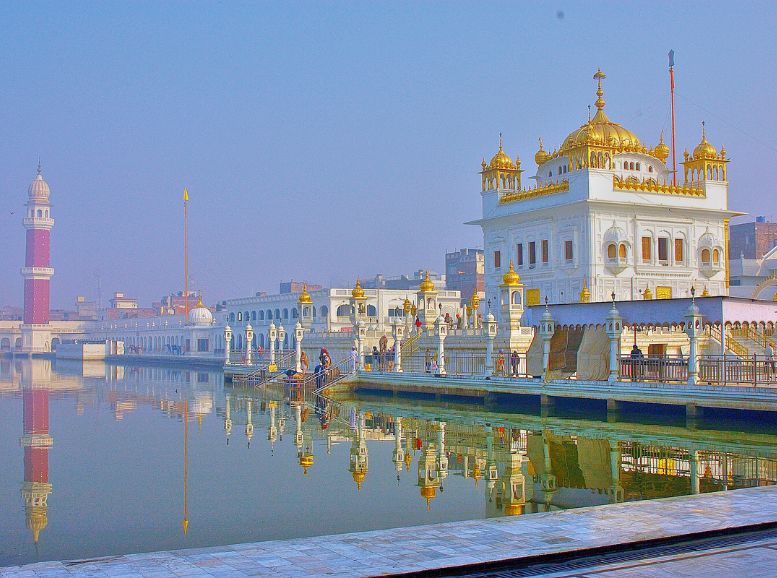In the heart of Punjab, where fertile plains meet the vibrant culture of Northern India, lies Tarn Taran Sahib, a place of deep spiritual significance. This revered site, steeped in history and architectural beauty, serves as a beacon for Sikh faith and heritage, attracting pilgrims and visitors from all corners of the globe.
Tarn Taran Sahib, which translates to ‘the holy pool of salvation,’ embodies the enduring legacy of Sikhism. It offers seekers a sanctuary for introspection, devotion, and connection with the divine. The tranquil waters of the holy pool and the ornate architecture of the gurdwara (Sikh house of worship) create a deeply spiritual atmosphere, inviting all who enter to embark on a journey of reverence and enlightenment.
Throughout this blog, we will embark on a virtual pilgrimage to Tarn Taran Sahib. We’ll explore the rich tapestry of its history, culture, and devotion. Join us as we delve into the significance of this sacred sanctuary, admire its architectural marvels, and discover the timeless teachings of Sikhism that continue to inspire and uplift millions worldwide.
How to reach:
By Road:
- From Amritsar: A quick and convenient trip awaits if you’re coming from Amritsar. Tarn Taran Sahib lies roughly 25 kilometers southeast, reachable by taxi or bus in 45 minutes to 1 hour (depending on traffic).
- From Other Cities: Traveling from other cities in Punjab or nearby states? Tarn Taran Sahib is well-connected by highways and roads. Choose from private taxis, buses, or car rentals for your journey.
By Train:
- Tarn Taran Junction Railway Station: This station serves as the closest railway access point, located within the town itself. Upon arrival, taxis, auto-rickshaws, or cycle-rickshaws can comfortably take you the remaining 2 kilometers to the Tarn Taran Sahib Gurudwara complex.
By Air:
- Sri Guru Ram Dass Jee International Airport: This Amritsar airport is the nearest air link, approximately 30 kilometers away. From the airport, taxis and buses are readily available to transport you to Tarn Taran Sahib.
Local Transportation:
- Exploring the Town: Once you arrive in Tarn Taran Sahib, navigating the town is a breeze. Explore on foot or utilize readily available local transportation options like cycle-rickshaws or auto-rickshaws. These are perfect for short trips within the town and reaching the Gurudwara complex.
Best time to visit:
(October to March):
- Peak Season: Winter reigns supreme for comfortable exploration and vibrant celebrations.
- Cool Temperatures: Enjoy exploring the shrine complex and participating in religious ceremonies under ideal weather conditions.
- Festivals: Immerse yourself in the fervor of important Sikh festivals like Guru Nanak Jayanti and Maghi, attracting devotees worldwide.
(March to April):
- Springtime Delight: Experience pleasant weather with blooming flowers and lush greenery enhancing the shrine’s beauty.
- Cultural Immersion: Witness traditional Sikh rituals and customs, gaining a deeper understanding of the heritage.
(September-October & April-June):
- Mild Temperatures & Clear Skies: Enjoy comfortable exploration outside the peak season with fewer crowds.
- Hydration & Sun Protection: Be mindful of the hotter months (May-June) and stay hydrated with sun protection.
(July-August):
- Heavy Rainfall & Flooding: Travel disruptions and limited outdoor activities are likely due to heavy monsoon rains.
Attractions:
Gurudwara Sri Tarn Taran Sahib:
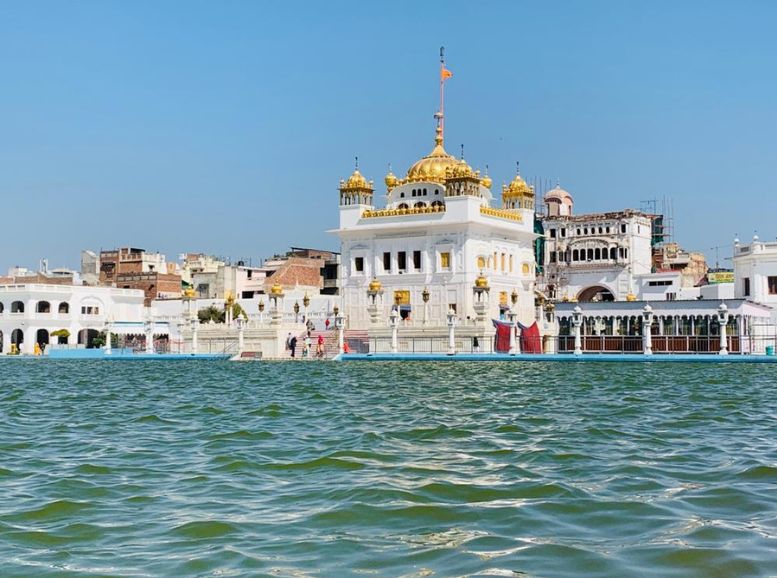
At the heart of Tarn Taran Sahib lies Gurudwara Sri Tarn Taran Sahib, a magnificent Sikh shrine renowned for its serenity and architectural grandeur. This crown jewel boasts the largest Sarovar (holy water tank) among all Sikh shrines. Devotees from all walks of life gather here to partake in the sacred ritual of taking a dip in the Sarovar, seeking spiritual cleansing and blessings.
The Gurudwara’s architecture itself is a captivating display of Sikh heritage and craftsmanship. Intricate marblework and gleaming gold plating adorn the structure, leaving visitors in awe of its beauty.
Sarovar (Holy Water Tank):
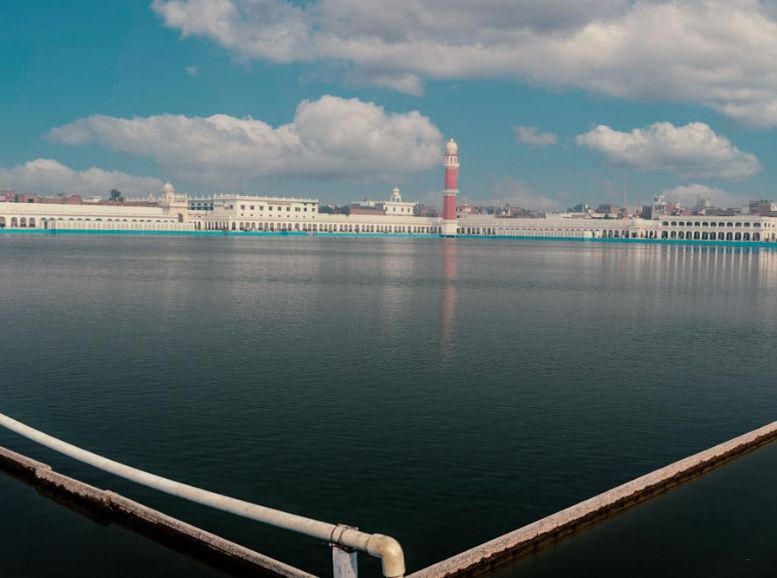
The serene Sarovar (holy water tank) surrounding Gurudwara Sri Tarn Taran Sahib serves as the focal point for spiritual activities and rituals. Its tranquil waters hold deep significance for Sikh devotees. Many believe these waters possess healing properties and offer divine blessings.
Partaking in the customary bath in the Sarovar is a core spiritual experience for pilgrims visiting Tarn Taran Sahib. The opportunity to participate in Kar Seva (selfless service) by helping clean and maintain the Sarovar is another cherished aspect for many. This act of service fosters a profound sense of community and devotion among devotees.
Surrounding Gardens and Landscapes:
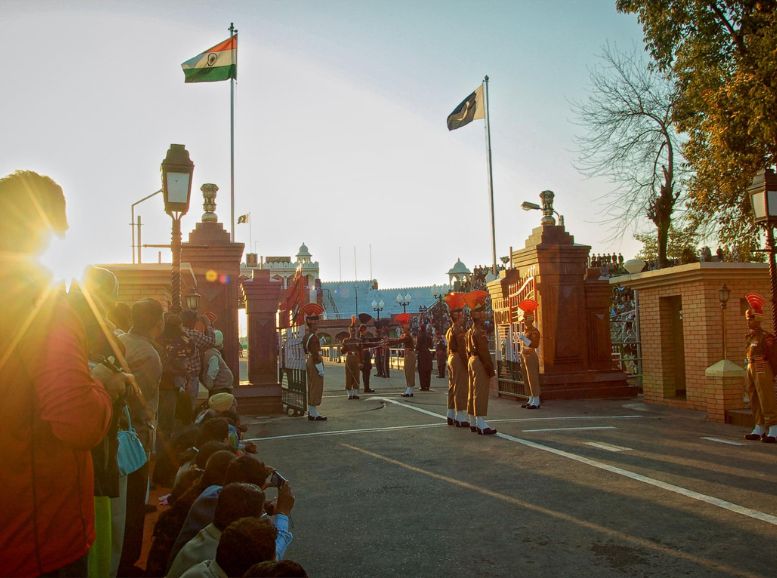
Beyond the awe-inspiring Gurudwara, the well-maintained gardens and landscaped areas surrounding the complex offer a haven of serenity for reflection and contemplation. Indulge in moments of peace amidst lush greenery, fragrant flowers, and soothing water features. These picturesque surroundings enhance the spiritual ambiance of Tarn Taran Sahib, providing a welcome respite for the soul.
Religious Sites:
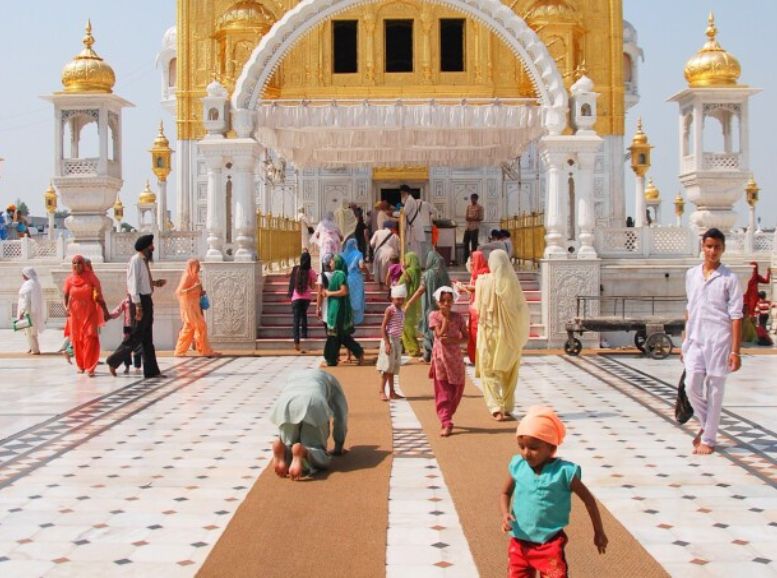
- Gurdwara Guru Ka Khuh: Explore this revered site and delve into the stories associated with it.
- Gurdwara Baba Garja Singh Baba Bota Singh: Pay homage at this sacred space and learn about the profound spiritual experiences linked to these revered figures.
By visiting these additional sites, you can gain a richer understanding of Sikhism’s history and traditions, further enriching your pilgrimage to Tarn Taran Sahib.
Local experiences:
Village Immersion: Embark on a guided tour of nearby villages. Interact with local farmers, artisans, and families to gain insights into their way of life. Witness traditional practices like farming, handicrafts, and vibrant folk arts firsthand.
Culinary Delights: Indulge in the rich flavors of Punjab. Sample local delicacies at roadside dhabas (eateries) or traditional restaurants. Savor iconic dishes like Amritsari kulcha, makki di roti with sarson da saag, and refreshing lassi.
Folk Rhythms: Immerse yourself in the vibrant tapestry of Punjabi folk music and dance. Attend a live performance of Bhangra, Giddha, or other traditional forms. Witness the energetic movements and rhythmic beats, perhaps even joining in the festivities!
Handicraft Treasures: Explore bustling markets brimming with authentic Punjabi handicrafts, textiles, and souvenirs. Admire intricate Phulkari embroidery, colorful juttis (footwear), and vibrant Patiala suits – perfect mementos of your journey.
Cultural Gems: Delve into Punjab’s rich heritage at cultural centers or museums. Interactive exhibits, workshops, and performances showcase the region’s history, art, music, and cuisine.
Heritage Walks: Embark on leisurely strolls through historic streets of Tarn Taran and neighboring towns. Discover architectural marvels, ancient temples, and Sikh heritage sites. Local guides can unfold the fascinating stories and legends woven into these landmarks.
Agricultural Delights: Experience Punjab’s agricultural way of life. Participate in farm tours, tractor rides, or even rural farm stays. Learn about crop cultivation, dairy farming, and sustainable practices directly from local farmers.
Artistic Pursuits: Unleash your inner artist! Enroll in workshops conducted by local artisans. Learn traditional Sikh art forms like Gurmukhi calligraphy, miniature painting, or even Sikh martial arts (Gatka). Create your own masterpiece under the guidance of skilled craftsmen.
Festivals and Celebrations: Immerse yourself in the vibrant spirit of Sikh festivals like Guru Nanak Jayanti, Vaisakhi, and Gurpurabs. Witness colorful processions, participate in spiritual discourses, and relish community feasts.
Village Homestay: Experience the warmth of Punjabi hospitality by opting for a village homestay. Live with local families, participate in daily chores, and savor home-cooked meals prepared with fresh, local ingredients.
Travel tips:
Respectful Attire & Conduct: Remember, Tarn Taran Sahib is a sacred pilgrimage site. Dress modestly and maintain decorum within the Gurudwara complex. Cover your head with a scarf or turban, remove shoes before entering, and avoid loud noises or disrespectful behavior.
Plan Your Visit: Check the timings for daily rituals, prayer sessions, and Langar (community meal) at Gurudwara Sri Tarn Taran Sahib beforehand. This will help you plan your itinerary and ensure you witness these important aspects of the Gurudwara.
Pack Smart: Essentials like sunscreen, sunglasses, a water bottle, and comfortable walking shoes are crucial for exploring the complex and surrounding areas. Consider a small backpack for your belongings.
Photography Etiquette: While photography is allowed in designated areas, always seek permission before taking photos, especially near religious rituals or sensitive areas. Respect the sanctity of the surroundings by avoiding flash photography.
Stay Hydrated & Nourished: Tarn Taran Sahib can get crowded, especially during festivals. Stay hydrated by carrying a water bottle and consider partaking in the Langar, a free community meal offered at the Gurudwara.
Embrace Cultural Exchange: Interact with the local Sikh community and fellow pilgrims to gain valuable insights into Sikh culture, traditions, and spirituality. Be open to learning about their customs and engage in respectful conversations.
Responsible Tourism: Be a mindful visitor. Dispose of waste responsibly, avoid littering, and respect the environment. Follow “Leave No Trace” principles to minimize your impact.
Stay Informed: Keep yourself updated on local news, weather forecasts, and any travel advisories or safety guidelines issued by authorities. Be aware of your surroundings and follow instructions from Gurudwara staff or security personnel.
Safety First: Prioritize your safety. Be cautious of your belongings, especially in crowded areas, and avoid venturing alone into secluded areas. If you need help, don’t hesitate to seek assistance from Gurudwara staff or local authorities.
Cultural Sensitivity: Remember, Tarn Taran Sahib holds deep religious significance. Be respectful of the Sikh community’s sentiments and cultural practices. Refrain from behavior that might be considered offensive, and embrace the principles of tolerance and mutual respect.
Conclusion
A pilgrimage to Tarn Taran Sahib transcends a religious visit, offering a profound immersion into the heart of Sikhism, Punjab’s rich culture, and the warmth of its people. Exploring the sacred grounds of Gurudwara Sri Tarn Taran Sahib and venturing beyond, you’ll be enveloped in devotion, tranquility, and cultural vibrancy. Tarn Taran Sahib, a testament to Sikhism’s enduring legacy founded in the 16th century by Guru Arjan Dev Ji, commemorates the martyrdom of Guru Hargobind Sahib Ji’s son. Its majestic architecture, serene Sarovar, and timeless teachings beckon pilgrims and seekers from all walks of life, inspiring journeys of self-discovery and spiritual enlightenment. Plan your enriching pilgrimage with Xplro.com. Their expert guides can navigate the cultural nuances and historical significance, ensuring a truly meaningful experience. So, if you seek a pilgrimage that nourishes the soul and broadens the mind, Tarn Taran Sahib awaits – a place where faith, culture, and breathtaking beauty converge, leaving an indelible mark on all who visit.
FAQ
- What is Tarn Taran Sahib?
- Tarn Taran Sahib is a significant Sikh pilgrimage site located in the Tarn Taran district of Punjab, India, known for its religious importance in Sikhism.
- Where is Tarn Taran Sahib situated?
- Tarn Taran Sahib is situated in the Tarn Taran district of Punjab, approximately 25 kilometers southeast of the city of Amritsar.
- What is the historical background of Tarn Taran Sahib?
- Tarn Taran Sahib was founded by Guru Arjan Dev Ji, the fifth Sikh Guru, in the 16th century. It was established to commemorate the martyrdom of Guru Arjan Dev Ji’s son, Guru Hargobind Sahib Ji.
- What are the main attractions at Tarn Taran Sahib?
- The main attractions at Tarn Taran Sahib include Gurudwara Sri Tarn Taran Sahib, the Sarovar (holy water tank), the community kitchen (Langar), and architectural wonders reflecting Sikh heritage.
- What are the visiting hours for Tarn Taran Sahib?
- Tarn Taran Sahib is open to visitors throughout the day. However, it’s recommended to check specific timings for rituals, prayer sessions, and Langar services.
- Is there an entrance fee for Tarn Taran Sahib?
- No, there is no entrance fee to visit Tarn Taran Sahib. It welcomes all visitors, regardless of their religion or background, free of charge.
- What is the dress code and etiquette for visiting Tarn Taran Sahib?
- Visitors are required to cover their heads with a scarf or turban and remove their shoes before entering the Gurudwara complex. Modest attire and respectful conduct are encouraged.
- Are photography and videography permitted at Tarn Taran Sahib?
- Yes, photography and videography are generally allowed in designated areas of the Gurudwara complex. However, visitors should seek permission before capturing images, especially during religious ceremonies.
- What are the nearby attractions to visit alongside Tarn Taran Sahib?
- Nearby attractions include Gurdwara Guru Ka Khuh, Gurdwara Baba Garja Singh Baba Bota Singh, and other historical and religious sites in the vicinity.
- How can visitors reach Tarn Taran Sahib?
- Tarn Taran Sahib is accessible via road, rail, and air. It is approximately 25 kilometers from Amritsar, with well-connected transportation options available.
- What types of accommodations are available near Tarn Taran Sahib?
- Visitors can find various accommodations in Tarn Taran town, including hotels, guesthouses, and lodges, catering to different budgets and preferences.
- Is Tarn Taran Sahib open year-round?
- Yes, Tarn Taran Sahib remains open year-round for pilgrims and visitors. However, it’s recommended to check for any special events or religious festivals that may impact visitation schedules.




